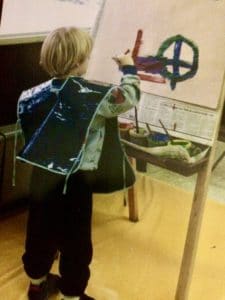By Susan Goldberg Schwartz
 I noticed my son Yaron had artistic talent when he was around 5 years old. His attention to little details showed in his drawings and intricate Lego creations. As he grew older and more talented, I often spoke of his ability as a ‘gift from God’. Reading this week’s parasha, Torah portion, I found an understanding of that simple phrase.
I noticed my son Yaron had artistic talent when he was around 5 years old. His attention to little details showed in his drawings and intricate Lego creations. As he grew older and more talented, I often spoke of his ability as a ‘gift from God’. Reading this week’s parasha, Torah portion, I found an understanding of that simple phrase.
The drama of Moses receiving the 10 Commandments continues in this week’s portion, Ki Tissa, with the well-known story of the Golden Calf. Commentators have written that this incident of idol worship was a pivotal moment in the relationship between the Israelites and God as we witness the serious consequences for their wrongdoing. This parasha also reveals Moses’ anger as he smashes the first tablets, and restates God’s reminder of the importance of keeping Shabbat. However, as I reread this section, I kept returning to one verse.
Exodus Chapter 31 introduces us to Bezalel whom God has singled out as the chief artisan of the Tabernacle in charge of building the Ark of the Covenant. Verse 31:3 says: I have endowed him (Bezalel) with a divine spirit (ruach elohim) of skill, ability and knowledge in every kind of craft. In his Torah commentary, Gunther Plaut shared that this ‘extraordinary craftsmanship was considered a divine gift.’
Bezalel was a craftsperson in many trades – metal, jewelry, fabric, and wood. He was both a designer and an instructor. Artisans today, who know how long it takes to hone their skills, would confirm that Bezalel was gifted. Bezalel’s name also gives us a clue to his divine gift, as it translates to ‘in the shadow of God. (b’ = “in”; tzal = “shadow”; el = “God”) In God’s shadow, Bezalel was filled with creative skill.
This month, we mark one year since the arrival of COVID-19. For many, this has been a year of anxiety, fear, anger and loneliness. For others, this has been a year of growth, untapped resources and unexplored gifts. I have mastered zoom in ways that I hadn’t expected – leading Shabbat services, engaging with toddlers and sharing deep conversations.
 Throughout Ki Tissa, we witnessed fear, impatience, and anger, yet we were also given a glimpse of God’s gifts. I believe that like Bezalel, my son, who now designs and builds custom furniture that we proudly display, was indeed endowed with a divine gift.
Throughout Ki Tissa, we witnessed fear, impatience, and anger, yet we were also given a glimpse of God’s gifts. I believe that like Bezalel, my son, who now designs and builds custom furniture that we proudly display, was indeed endowed with a divine gift.
Our souls are filled with potential gifts of goodness, generosity, creativity and compassion. When we recognize and realize our own gifts, each of us can find our spark of the divine. Brené Brown, American professor, lecturer and author said, “Owning our worthiness is the act of acknowledging that we are sacred.”
Susan Goldberg Schwartz is the Director of Jewish Experience with the Center for Jewish Engagement and Learning, and the proud mother of two adult children, Liat Notaro and Yaron Pardo, and the grandmother of Liora and Zev Notaro.

